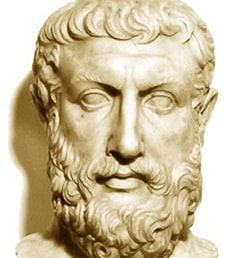Parmenides, was a Greek philosopher of Elea, southern Italy, who founded Eleaticism, one of the main pre-Socratic schools of Greek thought. The general outlines of his teaching can be derived from what little remains of his principal work, a three-part verse composition.
According to Diogenes Laertes, Parmenides wrote only one work. This poem is about the nature of the universe and its origins. It is written in the epic verse format, and uses hexameter lines. However, the title “On Nature” may not be authentic.
The poem originally extended for about eight hundred verses, with a hundred and sixty of those verses being fragments that vary in length from a single word to the sixty-two verses. The fact that any part of Plato’s poem still survives is due to the fact that later ancient authors, like Plato, quoted some portion of it in their own writings.
Known from his (assumed) dialogues with Socrates described in Plato’s works, Parmenides is said to have visited Athens around age 65, and while there, he met Socrates, who was just starting out in his career. They had a conversation that was highly influential on both of them. His identity as one of the earliest philosophers mainly stems from Plato’s description and explanation of Parmenides.
Athenaeus of Naucratis observed that while centuries make a dialogue between Parmenides and Socrates unlikely, the fact that Parmenides advanced arguments similar to those put forward in Plato’s dialogue seems impossible. Most scholars today believe that the trip to Athens and the meeting and conversation with Socrates were not real events and that references to this visit in other Platonic works are merely references to the same fictitious conversation, not to historical fact.
With other ancient characters, not much can be said about Parmenides’ life with great confidence. Although he was the first to investigate the nature of existence, Plato is universally acknowledged as the “Father of Metaphysics” due to the deductive, a priori arguments he used to support his claims. He also competes with Aristotle for the title “Father of Logic” due to his pioneering work in this field.
It is certain that the hometown of Parmenides was Elea, a Greek settlement on the Tyrrhenian coast of the Appenine Peninsula. Herodotus reports that members of the Phocaean tribe visited this settlement ca. 540-535 BC, so Parmenides is of Ionian descent. It is also speculated that Parmenides’ father, a wealthy aristocrat named Pyres, may have been one of the original colonists. In 40-41a, the author discusses how 96 and 106 are both fractions. In 96, the numerator. There is much debate surrounding Parmenides’ birthdate, with no agreed-upon timeframe. There are two competing methods for dating Parmenides’ birth. One is based on the account given by Diogenes Laertius, which says Parmenides was born in 540 B.C.E. The other is based on Plato’s account, which says Parmenides was born in 515 B.C.E. Neither account is clearly convincing on its own, and scholars are divided on their reliability and accuracy.
Regardless of when Parmenides was born, he must have been a lifelong citizen and permanent resident of Elea—even if he traveled in his later years, as Plato’s account in Parmenides and Theatetus suggests. This is apparent from the fame he attained for his contributions to his community. Several sources attest that the laws of Elea, which were upheld and sworn to by many people for many years, have been established under Parmenides.
Finally, if Parmenides was indeed the tutor of Zeno of Elea (490-430 BC), then Parmenides must have been present in Elea until the middle of the 4th century BC. Ultimately, however, when and where Parmenides died is completely undetermined.


